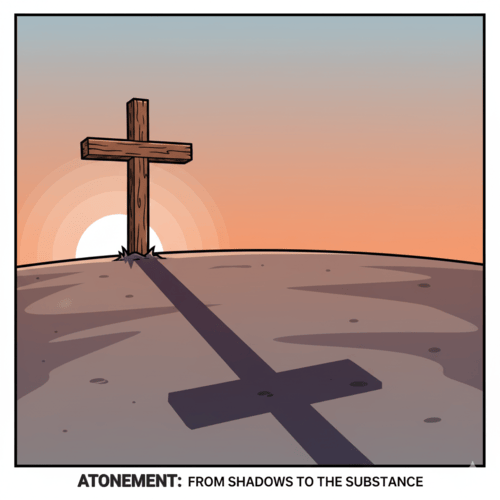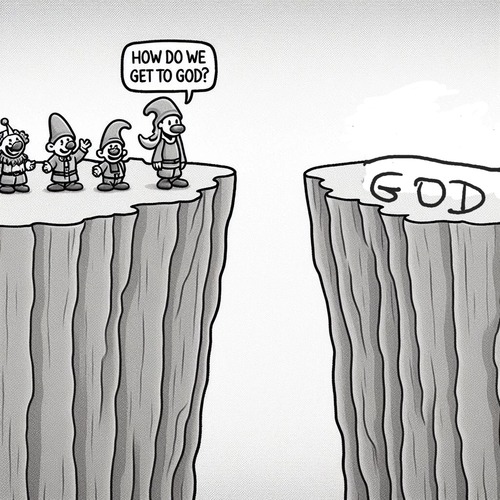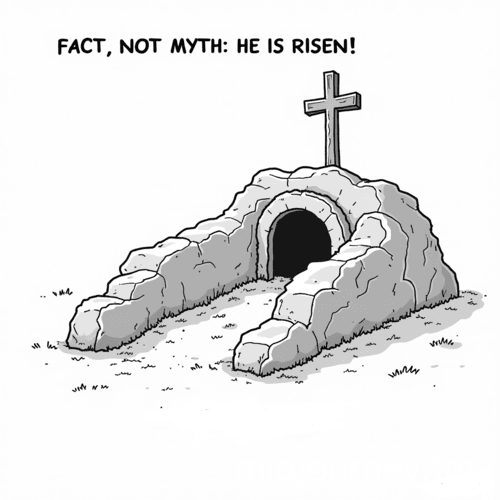Does the New Testament Distort the Jewish Atonement?
**Editor’s Note: This post is part of our series, ‘Satan’s Lies: Common Deceptions in the Church Today’…
Many Jewish scholars raise pointed questions about how Christianity presents their faith. They argue Christians have created a false picture of Judaism as a cold, works-based religion where people desperately tried to earn God’s favour through endless sacrifices and rule-following. This caricature, they contend, makes Christianity look like the warm, gracious alternative that rescued humanity from legalistic bondage. But is this fair? Does the New Testament actually distort the Jewish atonement, or have we simply misunderstood what both testaments teach?
From a Reformed perspective, the answer is clear: the New Testament doesn’t distort Jewish atonement—it reveals its true meaning. Far from being opposing systems, Jewish and Christian atonement represent one continuous story of God’s grace, with the same foundation, the same pattern, and the same ultimate fulfillment in Jesus Christ.
THE FOUNDATION: GRACE IN THE OLD COVENANT
God’s covenant was always initiated by divine grace, not human effort. When God called Abraham, He didn’t first demand good behaviour. Instead, Scripture records “Abraham believed God, and it was counted to him as righteousness” (Genesis 15:6). This happened before circumcision, before the law, before any religious ritual. Faith alone justified Abraham, making him the father of all who believe.
Even the giving of the law began with grace. Before delivering the Ten Commandments, God reminded Israel: “You yourselves have seen what I did to the Egyptians, and how I bore you on eagles’ wings and brought you to myself” (Exodus 19:4). The rescue came first, then the relationship. God didn’t save Israel because they followed His laws; He gave them laws because He’d already saved them.
The sacrificial system was God’s gracious provision, not humanity’s desperate invention. In Leviticus 17:11, God declares, “The life of the flesh is in the blood, and I have given it for you upon the altar to make atonement for your souls.” Notice the phrase “I have given it”—atonement was God’s gift, not Israel’s achievement. As John Calvin observed, the sacrifices were never meant to earn God’s favour but to receive what He’d already graciously provided.
We recognise this continuity: The Westminster Confession teaches there has always been only one “covenant of grace,” administered differently across time but grounded in the same divine mercy. Jewish atonement was never about works-righteousness—that’s a misunderstanding that does injustice to both testaments.
THE PATTERN: SUBSTITUTIONARY ATONEMENT THROUGHOUT SCRIPTURE
From the very beginning, God established the principle of substitution. When Adam and Eve sinned, God didn’t leave them exposed in their shame. Instead, He killed animals and “made for them garments of skins and clothed them” (Genesis 3:21). An innocent life covered their guilt—the first hint of substitutionary atonement.
- The pattern became explicit with Abraham and Isaac. When God tested Abraham’s faith, He provided a ram “caught in a thicket” to die in Isaac’s place (Genesis 22:13). Abraham named that place “The Lord will provide”—establishing the principle that God Himself supplies the substitute for judgement.
- The Levitical system operated on substitutionary principles. On the Day of Atonement, the high priest placed his hands on the scapegoat, symbolically transferring Israel’s sins to the innocent animal, which then carried those sins “into the wilderness” (Leviticus 16:21-22). Meanwhile, another goat died as a sacrifice, its blood making propitiation for sin. The repeated phrase throughout Leviticus is telling: “the priest shall make atonement for him, and he shall be forgiven” (Leviticus 4:20, 26, 31). Forgiveness came through the substitute’s death, not the sinner’s efforts.
- The prophets anticipated the ultimate substitute. Isaiah 53 describes the Suffering Servant who “was wounded for our transgressions” and “crushed for our iniquities,” bearing punishment so that “with his stripes we are healed” (Isaiah 53:5). This wasn’t a new idea—it was the culmination of everything the sacrificial system had been pointing toward.
Reformed theologian Francis Turretin captured this beautifully: Old Testament saints were saved by looking forward in faith to the coming Messiah, just as we look back in faith to the accomplished work of Christ. Same object of faith, different perspectives in redemptive history. The Jewish atonement system wasn’t a failed experiment—it was a God-ordained preview of the real thing.
THE FULFILLMENT: CHRIST AS ULTIMATE ATONEMENT
Jesus didn’t replace the Jewish system—He perfected it. As the book of Hebrews explains, Christ became the ultimate High Priest who “offered for all time a single sacrifice for sins” (Hebrews 10:12). He entered not an earthly tabernacle but “heaven itself, now to appear in the presence of God on our behalf” (Hebrews 9:24). Every aspect of Jewish atonement found its perfect expression in Jesus.
Christ explicitly affirmed this continuity. He declared, “Do not think that I have come to abolish the Law or the Prophets; I have not come to abolish them but to fulfil them” (Matthew 5:17). After His resurrection, He explained to His disciples “everything… in the Law of Moses and the Prophets and the Psalms” was about Him (Luke 24:44). In short, the entire Hebrew Bible was about Him.
The “new covenant” promised in Jeremiah wasn’t entirely new—it was the fulfillment of God’s ancient promises. When Jeremiah spoke of God writing His law on hearts and forgiving sins (Jeremiah 31:31-34), he was describing the same gracious God who had always forgiven sins through substitutionary sacrifice. The difference wasn’t in God’s character but in the clarity and permanence of the provision.
Paul’s teaching about Abraham proves the continuity. In Romans 4, Paul argues Abraham “is the father of all who believe without being circumcised” (Romans 4:11). Gentile Christians aren’t joining a different religion—they’re being grafted into the same olive tree, worshiping the same God, trusting the same promises, justified by the same faith that saved Abraham, Isaac, and Jacob.
ANSWERING COMMON OBJECTIONS
The real problem isn’t “law versus grace” but “shadow versus reality.” Both testaments reveal salvation by grace through faith. The Jewish sacrifices were never meant to save people by their own merit—they were “a shadow of the good things to come” (Hebrews 10:1), pointing forward to the substance found in Christ.
God hasn’t rejected His covenant people. As Paul emphatically states, “God has not rejected his people whom he foreknew” (Romans 11:2). The church doesn’t replace Israel—it joins Israel in worshiping the God of Abraham, Isaac, and Jacob through the Jewish Messiah.
We should celebrate progressive revelation rather than creating false objections. God revealed His plan gradually, like a sunrise that grows brighter until full day. The later light doesn’t contradict the earlier dawn—it fulfils it.
CONCLUSION
The New Testament doesn’t distort the Jewish atonement—it unveils its true meaning. From Eden’s first sacrifice to Calvary’s final offering, God has consistently provided substitutionary atonement through His grace alone. This should humble Christian hearts, deepen our appreciation for the Hebrew Scriptures, and encourage respectful dialogue with our Jewish neighbours who treasure the same sacred texts that point to our shared Messiah.
The God who said “I have given it for you” in Leviticus is the same God who “gave his only Son” in John 3:16. That’s not distortion—that’s beautiful, divine consistency.
DOES THE NEW TESTAMENT DISTORT JEWISH ATONEMENT? RELATED FAQs
What do Reformed scholars say about Jewish understanding of their own atonement system? Michael Horton and Scott Hahn emphasise that Second Temple Judaism itself recognised the inadequacy of animal sacrifices, evidenced by prayers such as “May this offering be acceptable before You as if I had offered my very soul.” Richard Gaffin Jr notes Jewish liturgy consistently emphasised God’s mercy rather than human merit. This supports the Reformed position that faithful Jews always understood their sacrifices as dependent on divine grace, not human achievement.
- Why do some Jewish scholars claim Christians invented the idea of “dying for sins”? This objection misunderstands both Jewish and Christian sources. Reformed scholar Willem VanGemeren points out substitutionary death appears throughout Hebrew Scripture, from the Passover lamb to Isaiah’s Suffering Servant. The Talmud itself discusses the vicarious nature of sacrifice, with some rabbis teaching that the death of the righteous can atone for others. Christians didn’t invent this concept—we recognise its ultimate fulfillment in Christ’s perfect sacrifice.
- How do we answer the claim that Paul “invented” salvation by faith alone? Scholars like Tom Schreiner and Douglas Moo demonstrate Paul’s teaching directly flows from Hebrew Scripture. Abraham was justified by faith (Genesis 15:6), David spoke of forgiveness without works (Psalm 32:1-2), and Habakkuk declared “the righteous shall live by faith” (Habakkuk 2:4). Paul didn’t invent these doctrines—he revealed their consistent application across redemptive history under the covenant of grace.
- What about the Jewish objection that Christians focus too much on blood and death? Reformed theologian Sinclair Ferguson addresses this by noting that the emphasis on blood comes from the Hebrew Bible itself: “without the shedding of blood there is no forgiveness” (Hebrews 9:22, quoting Leviticus 17:11). The focus isn’t on death for its own sake but on life—blood represents life given for life. Jewish scholar Jon Levenson acknowledges that sacrifice in Hebrew thought was fundamentally about life-giving, not mere destruction, which aligns perfectly with the Reformed understanding of Christ’s life-giving death.
- How do we respond to claims that the early church “de-Judaised” Christianity? Leading Reformed historians like Richard Muller and Carl Trueman argue the opposite occurred. The early church fathers extensively quoted Hebrew Scripture, maintained Jewish liturgical patterns, and saw themselves as the true Israel. Reformed theology particularly emphasises this continuity through covenant theology—the church didn’t replace Israel but represents the ingrafting of Gentiles into the same olive tree (Romans 11:17-24). The supposed “de-Judaisation” is actually a return to Christianity’s thoroughly Jewish roots.
What’s the Christian view on whether modern Judaism without animal sacrifice can truly provide atonement? Reformed scholars like Michael Brown and Richard Pratt Jr approach this sensitively, noting rabbinic Judaism itself recognises the problem of atonement without sacrifice, developing complex systems of prayer, repentance, and good works as substitutes. However, from a covenantal perspective, these alternatives cannot satisfy God’s justice as revealed in Scripture—only the perfect sacrifice of Christ provides true atonement. This doesn’t diminish respect for Jewish people but recognises their need for the Messiah who fulfils their own Scriptures’ promises.
DOES THE NEW TESTAMENT DISTORT JEWISH ATONEMENT? OUR RELATED POSTS
Editor's Pick

From Danvers To Nashville: Two Statements, One Biblical Vision
30 years separate the Danvers Statement on Biblical Manhood and Womanhood (1987) and the Nashville Statement on Human Sexuality (2017). [...]

The Nashville Statement: Why Affirm It Despite Media Backlash?
WHY DO REFORMED CHRISTIANS STAND BY THIS STATEMENT ON MARRIAGE AND GENDER? When the Nashville Statement was released in 2017, [...]

Who Is Belial? Solving The 2 Corinthians 6:15 Mystery
Belial: This name from the pages of Scripture chills the soul. Who is this mysterious figure Paul invokes in 2 [...]

Celibacy Or Castration: What Jesus Really Means in Matthew 19:12
One of Scripture's most shocking misinterpretations led theologian Origen to castrate himself in the third century. His tragic mistake? Taking [...]

Philippians 4:13: Did Paul Really Mean We Can Do ALL Things?
"I can do all things through Christ who strengthens me." It's on gym walls, graduation cards, and motivational posters everywhere. [...]

The Ordinary Means of Grace: Why Are They Indispensable?
ORDINARY MEANS FOR EXTRAORDINARY TRANSFORMATION What if God's most powerful work in believers' lives happens through the most ordinary activities? [...]

Is the Bible God’s Word? Or Does It Only Contain God’s Word?
The authority of Scripture stands at the crossroads of modern Christianity. While some argue the Bible merely contains God’s Word [...]

Will We Remember This Life in Heaven? What Isaiah 65:17 Means
"Will I remember my spouse in heaven? My children? Will the joy we shared on earth matter in eternity?" These [...]

From Empty to Overflow: The Abundant Life Jesus Promised
(AND WHY YOU SHOULDN’T SETTLE FOR LESS) We're surviving, but are we thriving? If we're honest, there's a gap between [...]

What Does Jesus Save Us From?
THREE BIBLE TRUTHS ABOUT SALVATION "Jesus saves." We’ve seen it on bumper stickers, heard it shouted at sporting events, maybe [...]
SUPPORT US:
Feel the Holy Spirit's gentle nudge to partner with us?
Donate Online:
Account Name: TRUTHS TO DIE FOR FOUNDATION
Account Number: 10243565459
Bank IFSC: IDFB0043391
Bank Name: IDFC FIRST BANK






